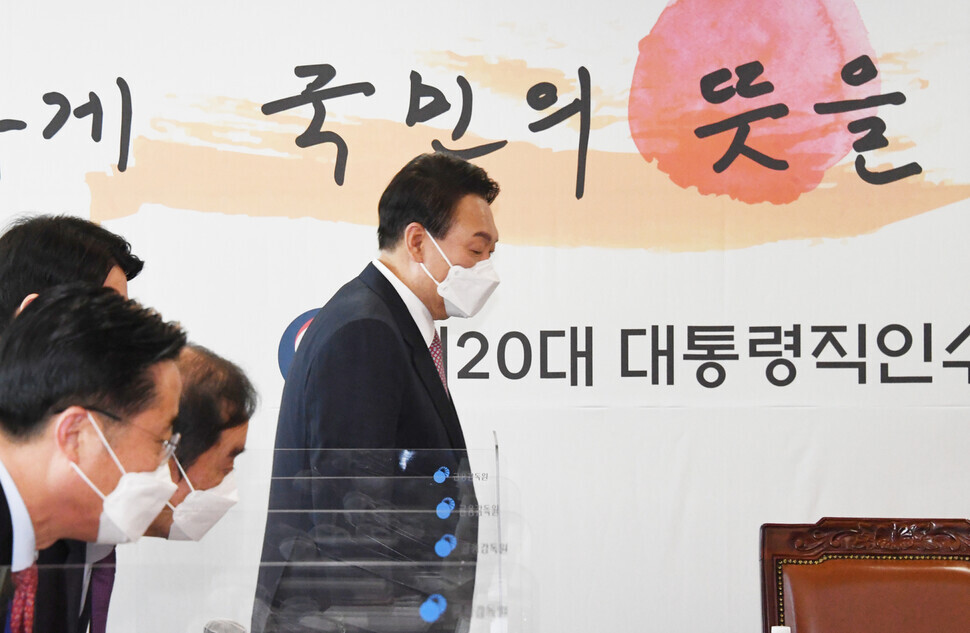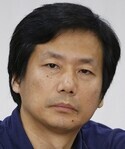hankyoreh
Links to other country sites 다른 나라 사이트 링크
[Column] Yoon Suk-yeol: South Korea’s accidental president


It’s no contested fact that President-elect Yoon Suk-yeol is an “accidental president.” Columnist Kim Dae-jung of The Chosun Ilbo called Yoon “someone who indeed became president ‘by accident,’” and Yoon himself has explained how he ended up accidentally throwing his hat in the ring for the Blue House by repeatedly saying that “the people called [him] forth” to the race.
The fact that Yoon is an “accidental president” means in other words that he didn’t rise to the top political office of the nation by being recognized for his qualifications and abilities demanded of a president. That is, not many voters who supported him did so because they believed he would do a good job of running state affairs.
For example, an opinion poll conducted from Feb. 3 to Feb. 4 by KSTAT Research with a confidence level of 95% and a margin of error of plus or minus 3.1 percentage points found that 64.8% of Yoon supporters endorsed the former prosecutor general because they wanted to flip the Blue House. Those who cited Yoon’s qualifications and abilities, or his policies and campaign pledges, only accounted for 4.1% and 9.7% of respondents, respectively.
There are a few more reasons that probably motivated voters on the day of the election to similar degrees. First, staunch conservatives’ desire to take back the Blue House launched Yoon into the political spotlight, helping him become the opposition’s top presidential contender. Then, the current administration’s failed real estate policies that resulted in skyrocketing housing prices, as well as the perceived hypocrisy of its public officials, enraged public sentiment and propelled Yoon to becoming accidental President Yoon.
The ongoing chaos in Yoon’s camp seems mostly to originate from Yoon’s accidental rise to the presidency. The very fact that an unprepared, accidental president came about is causing confusion among not just voters who didn’t support Yoon but those who cast their ballot for Yoon on election day.
Yoon’s push to relocate the presidential office to Yongsan, which he has chosen as his first administrative agenda, calls into question whether Yoon understands the gravity of the position of the president. National security is the most basic service the nation provides to its citizens. Likewise, the most basic service mindset demanded of the president should be his promise that he will not tolerate even an inch’s gap in national security.
However, Yoon’s continued dismissal of various concerns such as those regarding the problem of successively relocating the Defense Ministry and the Joint Chiefs of Staff and those concerning the end of the Blue House’s national emergency management system by insisting that “he cannot move out of the Blue House once he moves in” shows Yoon lacks an understanding of the basic obligations of the president.
There should be no need to reiterate the fact that, in pushing for a presidential office outside of the Blue House as a way to break away from being an “emperor-like president,” Yoon ended up displaying imperial attitudes of carelessness and non-communication instead. But it should also be pointed out how Yoon initially asserted that he would be able to begin his term at a Gwanghwamun presidential office by preparing through the presidential transition committee, saying “problems like presidential security and receiving outside guests have been thoroughly examined”; but how, within three to four days of his election, he switched courses, arguing for a presidential office in Yongsan by citing concerns regarding security and inconveniencing the public.
This attitude shift calls into question whether Yoon’s talk of a Gwanghwamun presidential office was a front — whether, with Yongsan already in mind, Yoon dangled the possibility of a presidential office in Gwanghwamun because the location was more popular among the public.
Whatever the case, Yoon’s camp should apologize first and foremost. Instead, the president-elect only continues to prop himself up, describing his actions as “resolve” rather than expressing regret over his flip-flopping words. Again, this can only be seen as a problem caused by Yoon’s accidental presidency — the fact that Yoon became president without having seriously considered that a political leader of a democratic nation should decide upon national agendas after sufficiently taking into account public opinion and participating in transparent debate.
Yoon wasted the “golden time” following his election — his first three weeks as president-elect — obsessing over relocating the presidential office to Yongsan because, aside from the issue, he doesn’t have a solid vision or government agenda that he can proudly present to the public. Though he has seized power, he himself is still in the dark in terms of what kind of nation and government he will build in order to advance the livelihood of the people.
This is the fundamental limitation of an “accidental president” who was elected solely on the basis of the empty slogan of “flipping the Blue House.” If Yoon was even the slightest bit prepared for government administration, a field so directly connected to the lives of the people, he wouldn’t be causing unnecessary trouble like he is doing currently, wasting precious administrative power.
More cause for concern and anxiety in this age of the accidental president is the fact that Yoon seems to lack a team of advisers who are unafraid to offer the president-elect forthright criticism. Instead of putting a stop to the political novice’s non-communicativeness, Yoon’s entourage is busy praising the former prosecutor general, describing his obstinacy as his “firm will to give up authority” (Kweon Seong-dong) and “a resolution for the future of the nation” (Kim Gi-hyeon). If things continue like this, the people will begin shouting in opposition one day.
Please direct questions or comments to [english@hani.co.kr]

Editorial・opinion
![[Editorial] Perilous stakes of Trump’s rhetoric around US troop pullout from Korea [Editorial] Perilous stakes of Trump’s rhetoric around US troop pullout from Korea](https://flexible.img.hani.co.kr/flexible/normal/500/300/imgdb/original/2024/0509/221715238827911.jpg) [Editorial] Perilous stakes of Trump’s rhetoric around US troop pullout from Korea
[Editorial] Perilous stakes of Trump’s rhetoric around US troop pullout from Korea![[Guest essay] Preventing Korean Peninsula from becoming front line of new cold war [Guest essay] Preventing Korean Peninsula from becoming front line of new cold war](https://flexible.img.hani.co.kr/flexible/normal/500/300/imgdb/original/2024/0507/7217150679227807.jpg) [Guest essay] Preventing Korean Peninsula from becoming front line of new cold war
[Guest essay] Preventing Korean Peninsula from becoming front line of new cold war- [Column] The state is back — but is it in business?
- [Column] Life on our Trisolaris
- [Editorial] Penalties for airing allegations against Korea’s first lady endanger free press
- [Editorial] Yoon must halt procurement of SM-3 interceptor missiles
- [Guest essay] Maybe Korea’s rapid population decline is an opportunity, not a crisis
- [Column] Can Yoon steer diplomacy with Russia, China back on track?
- [Column] Season 2 of special prosecutor probe may be coming to Korea soon
- [Column] Park Geun-hye déjà vu in Yoon Suk-yeol
Most viewed articles
- 1Nuclear South Korea? The hidden implication of hints at US troop withdrawal
- 2‘Free Palestine!’: Anti-war protest wave comes to Korean campuses
- 3In Yoon’s Korea, a government ‘of, by and for prosecutors,’ says civic group
- 4[Editorial] Perilous stakes of Trump’s rhetoric around US troop pullout from Korea
- 5Seoul getting its first-ever vertical farm
- 6[Photo] ‘End the genocide in Gaza’: Students in Korea join global anti-war protest wave
- 7Gangnam murderer says he killed “because women have always ignored me”
- 8‘We must say no’: Seoul defense chief on Korean, USFK involvement in hypothetical Taiwan crisis
- 9With Naver’s inside director at Line gone, buyout negotiations appear to be well underway
- 10In South Korea, a war over how to remember the Vietnam War